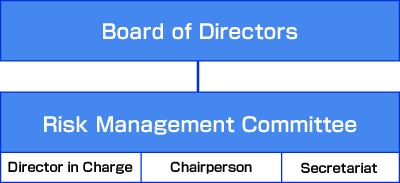Sustainability
EXEDY Group's Sustainability Activities
Risk Management
Our approach
The EXEDY Group recognizes that risk management is one of the most important management tasks and is working to enhance and strengthen it. With changes in the usiness environment surrounding the company, the risks facedby the EXEDY Group are expected to become increasingly diversified in the future. In order to respond to these circumstances, the EXEDY Group's action guideline for risk management is to prepare for emergencies by taking preventive measures and preparing in advance to minimize damage and to assess and identify risks to ensure their implementation. We identify major risk items related to safety and health, environmental preservation activities, and business continuity management activities, based on the frequency of occurrence, degree of impact, and surrounding conditions. We are working to strengthen our management system by clarifying the department responsible for each risk, the degree of impact of each risk, the causes of its occurrence, and proactive preventive measures.
Risk Management Committee
The Risk Management Committee, consisting of the President & CEO, (Senior) Managing Executive Officers, and Audit and Supervisory Board Members, convene as necessary to address group-wide issues and to discuss recurrence prevention measures.

The Risk Management Committee Schedule
In FY2022, the Risk Management Committee gathered 4 times to respond to group-wide problems and discuss recurrence prevention measures. In addition, information on risk issues is shared among group companies to ensure appropriate business execution.
Examples of Dealing with Risks
Initiatives Regarding Information Security
In the Great East Japan Earthquake of March 2011, the Kawagoe Plant suffered no severe damage but a tremor with a seismic intensity of lower 5 required a temporary evacuation of all employees. Fortunately, no damage was caused to the plant, and we took the necessary actions in response to the situation, such as shifting to nighttime production in response to production stoppages by automobile manufacturers and planned power outages. Having keenly realized the importance of prompt and efficient business recovery we have since established a BCP crisis management program as part of our Midterm Consolidated Management Plan and built an organization capable of responding to contingencies.
In addition to earthquakes, the EXEDY Group also recognizes climate change as an important environmental issue, including the increasing severity and frequency of extreme weather events. Concerning climate-related risks, the Sustainability Committee, a meeting body that formulates the Company's sustainability action plan and manages the progress and other matters, plays a central role in analyzing scenarios, evaluating and identifying risks, and managing the progress of response measures. The status of our responses to major risks is as follows. The risk of sales decline due to the suspension of sales of internal combustion engine vehicles, etc. is discussed at the Management Committee and Board of Directors meetings, leading to the formulation of a long-term vision and the strengthening of the product development system. Regarding the risk of increased direct costs from the introduction of renewable energy due to stricter government regulations, the Sustainability Working Group is researching and studying measures to address this issue, including gathering information on renewable energy options. Concerning the risk of supply chain disruptions due to floods, etc., the Risk Management Committee and other committees discussed and promoted business continuity plans that include suppliers.
Initiatives Regarding Information Security
Basic Approach
In order to properly protect confidential information and personal information from threats such as cyber attacks, we have developed and deployed policies and regulations concerning information security. By periodically educating employees, we strive to strengthen our information security and prevent information leakage.
Information Management
With the support of external experts with a deep knowledge of cyber security and internal fraud, we established a system to respond to information security incidents and advance warnings. While sharing information with external organizations, our company, including its affiliates, we work to make improvements to this environment. We also conduct regular targeted e-mail training for all employees, provide education regarding personal information protection and security, and promote thorough personal information protection and information security.
Initiatives Regarding Compliance Risk
Through our business activities in different regions around the world, we have learned that prompt and reliable compliance with the laws and regulations of each country and transparent management are essential for earning the trust of our stakeholders.
Furthermore, it is essential to respect human rights, to consider the health and working environment of employees, to treat employees fairly and appropriately, and to conduct fair and appropriate business transactions with suppliers to ensure better compliance.
And to prevent compliance violations, it's necessary to raise each employee's awareness of ethics and norms.
To achieve this goal, we continuously conduct various training and educational activities for our employees.
We also establish a whistle-blowing system and other measures to identify and correct compliance violations.








